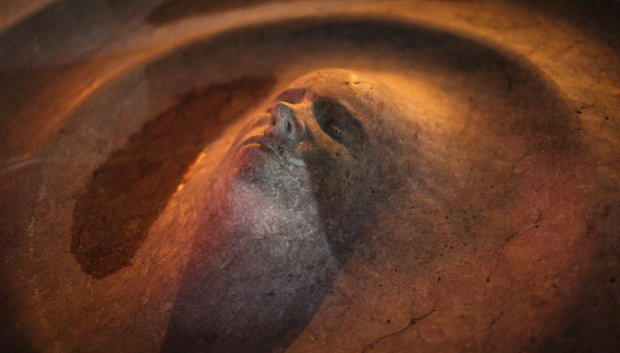2 May 2014 | News
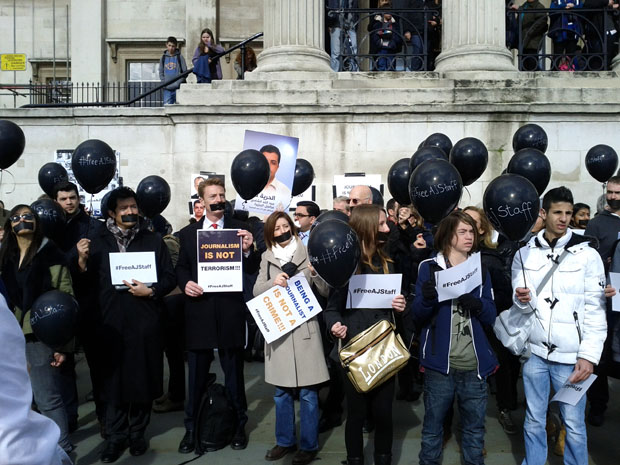
A London protest calling for the release of jailed Al Jazeera journalists in Egypt (Image: Index on Censorship)
Press freedom is at a decade low. Considering just a handful of the events of the past year — from Russian crackdowns on independent media and imprisoned journalists in Egypt, to press in Ukraine being attacked with impunity and government reactions to reporting on mass surveillance in the UK — it is not surprising that Freedom House have come to this conclusion in the latest edition of their annual press freedom report. This serves as a stark reminder that press freedom is a right we need to work continuously and tirelessly to promote, uphold and protect — both to ensure the safety of journalists and to safeguard our collective right to information and ability to hold those in power to account. On the eve of World Press Freedom day, we look back at some of the threats faced by the world’s press in the last 12 months.
1) Journalism is not terrorism…
National security has been used as an excuse to crack down on the press this year. “Freedom of information is too often sacrificed to an overly broad and abusive interpretation of national security needs, marking a disturbing retreat from democratic practices,” say Reporters Without Borders (RSF) in their recently released 2014 Press Freedom Index.
Journalists have faced terrorism and national security-related accusations in places known for their somewhat chequered relationship with press freedom, including Ethiopia and Egypt. However, the US and the UK, which have long prided themselves on respecting and protecting civil liberties, have also come under criticism for using such tactics — especially in connection to the ongoing revelations of government-sponsored mass surveillance.
American authorities have gone after former NSA contractor and whistleblower Edward Snowden, tapped the phones of Associated Press staff, and demanded that journalists, like James Risen, reveal their sources. British authorities, meanwhile, detained David Miranda under the country’s Terrorism Act. Miranda is the partner of Glenn Greenwald, the journalist who broke the mass surveillance story. Authorities also raided the offices of the Guardian — a paper heavily involved in reporting in the Snowden leaks.
2) …but governments still like putting journalists in prison
The Al Jazeera journalists detained in Egypt on terrorism-related charges was one of the biggest stories on attacks on press freedom this year. However, Mohamed Fahmy, Baher Mohamed, Peter Greste and their colleagues are far from the only journalists who will spend World Press Freedom Day behind bars. The latest prison census from the Committee to Protect Journalists (CPJ) put the number of journalists in jail for doing their job at 211 — their second highest figure on record.
In Bahrain, award-winning photographer Ahmed Humaidan was sentenced in March to ten years in prison. In Uzebekistan, Muhammad Bekjanov, editor of opposition paper Erk, is serving a 19-year sentence — which was increased from 15 in 2012, just as he was due to be released. In Turkey, after waiting seven years, Fusün Erdoğan, former general manager of radio station Özgür Radyo, was last November sentenced to life in jail. Just last Friday, Ethiopian authorities arrested prominent political journalist Tesfalem Waldyes and six bloggers and activists.
3) New media is under attack…
As more journalism is being conducted online, blogs, social and other new media are increasingly being targeted in the suppression of press freedom. Almost half of the world’s jailed journalists work for online outlets, according to the CPJ. China — with its massive censorship apparatus — has continued censoring microblogging site Sina Weibo, while also turning its attention to relative newcomer WeChat. In March, it closed down several popular accounts, including that of investigative journalist Luo Changping.
Meanwhile, Turkish Prime Minister Recep Tayyip Erdoğan has publicly all but declared war on social media, at one point calling it the “worst menace to society”. Twitter played a big role in last summer’s Gezi Park protests, used by journalists and other protesters alike. Only days ago, Turkish journalist Önder Aytaç was jailed, essentially, because of the letter “k” in a Tweet.
Meanwhile Russia has seen a big crackdown on online news outlets, while legislation recently passed in the Duma is targeting blogs and social media.
4) …and independent media continues to struggle
Only one in seven people in the world live in countries with free press. In many parts of the world, mainstream media is either under tight control by the government itself or headed up media moguls with links to those in power, with dissenting voices within news organisation often being pushed out. Brazil, for instance, has been labelled “the country of 30 Berlusconis” because regional media is “weakened by their subordination to the centres of power in the country’s individual states”. At the start of the year, RIA Novosti — known for on occasion challenging Russian authorities — was liquidated and replaced by the more Kremlin-friendly Rossiya Segodnya (Russia Today), while in Montenegro, has seen efforts by the government to cut funding to critical media. This is not even mentioning countries like North Korea and Uzbekistan, languishing near the bottom of press freedom ratings, where independent journalism is all but non-existent.
5) Attacks on journalists often go unpunished
A staggering fact about the attacks on journalists around the world, is how many happen with impunity. Since 1992, 600 journalists have been killed. Most of the perpetrators of those crimes have not been brought to justice. Attacks can be orchestrated by authorities or by non-state actors, but the lack of adequate responses by those in power “fuels the cycle of violence against news providers,” says RSF. In Mexico, a country notorious for violence against the press, three journalists were murdered in 2013. By last October, the state public prosecutor’s office had yet to announce any progress in the cases of Daniel Martínez Bazaldúa, Mario Ricardo Chávez Jorge and Alberto López Bello, or disclose whether they are linked to their work. Pakistan is also an increasingly dangerous place to work as a journalist. Twenty seven of the 28 journalists killed in the past 11 years in connection with their work have been killed with impunity. Syria, with its ongoing, devastating war, is the deadliest place in the world to be a journalist, while some of the attacks on press during the conflict in Ukraine, have also taken place without perpetrators being held accountable. That attacks in the country appear to be accelerating, CPJ say is “a direct result of the impunity with which previous attacks have taken place”.
This article was published on May 2, 2014 at indexoncensorship.org
17 Apr 2014 | Europe and Central Asia, News, Uzbekistan
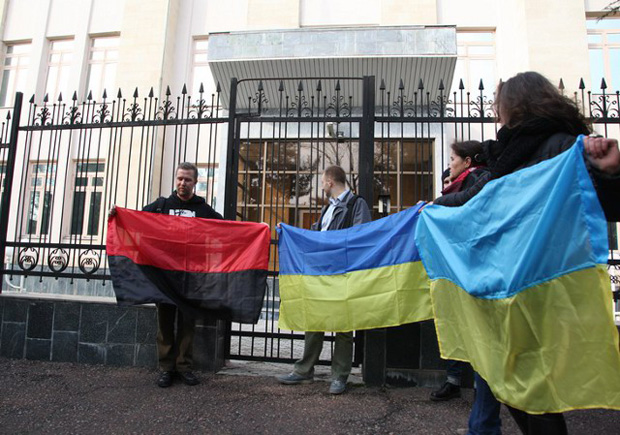
Umida Akhmedova took part in a small protest in Tashkent, in solidarity with the Euromaidan movement.
On 27 January, internationally renowned photographer Umida Akhmedova, her son Timur Karpov and seven other people took to the streets of Tashkent, Uzbekistan. Armed with Ukrainian flags, cameras and a petition, they staged a peaceful protest in solidarity with the Euromaidan movement.
Knowing they might attract unwanted attention, the group, which included one journalist reporting, posed for a few photos outside the Ukrainian embassy, handed over the petition, and quickly wrapped up the demonstration. However, their worries soon proved valid. Three days later, the protesters were hauled in one by one by police for a “short talk”. They would be held incommunicado for one day, first in a central Tashkent police station and later at a more remote location.
Karpov, a photographer based in Russia, told Index about unprofessional and aggressive officers, who called the protesters “dissidents” who were “ruining the constitution”. Passports and phones were taken away, but Karpov managed to keep one concealed to alert the outside world to their detention. It was eventually discovered and confiscated. When he got it back, it had been completely wiped. Without access to lawyers, the protesters were questioned by the SNB — the KGB’s successor — before being put through a quickie court session and ordered to pay fines of some £1,200. Three of them have been sentenced to 15 days in prison. Justice, as understood by Uzbekistan’s notoriously repressive regime.
This is not the first time Akhmedova has run into trouble with the regime of former Communist Party official Islam Karimov. In 2009, the photographer and documentary film maker, whose work has been published in The New York Times and Wall Street Journal, was charged with “damaging the country’s image” over a series of photographs depicting life in rural Uzbekistan. Similar charges were later levelled at her over a film about challenges facing Uzbek women, and in 2010, over a book about Uzbek traditions. It’s worth noting that she never intended to make a political statement with her work — the authorities’ reaction is what has politicised it. The cases have made Akhmedova a credible voice of opposition, and while her high profile provides some protection, it also means her every move is noted — as the latest case shows.
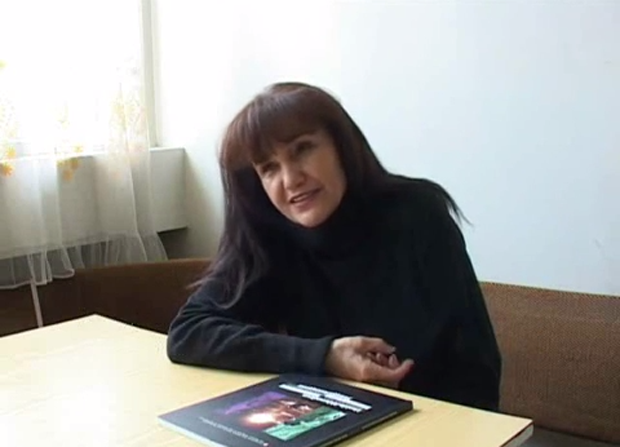
Umida Akhmedova (Image: Uznewsnet/YouTube)
“We live in a strict, archaic society, where all unregulated acts, especially those that can cause some kind of a response in the society, are nipped in the bud,” she told Index. “In the case of our Maidan project, the authorities did not have to be clairvoyants to see the similarities between the situation in Ukraine and the one in Uzbekistan. The government has started scaring children and adults with the word Maidan and did not like it when we showed support for Maidan.”
“As for our previous case,” she adds “we were charged with slander and insult of Uzbek nation, because the government wanted to teach us a lesson that without the approval from above, we were not allowed to film anything or publish books, or generally, do anything artistic without a superior permission.”
While Akhmedova’s latest arrest hit headlines across Central Asia, the story made little impact in the west. This is not surprising. Earlier this year the soap opera-like falling out between first daughter Gulnara Karimova — businesswoman, sometimes pop star, and until recently tipped to follow in her father’s presidential footsteps — and, seemingly, the rest of the family was covered by media outside the country. But on the whole, Uzbekistan rarely commands international attention. Like many other countries in the region, it is able to carry out its repressive rule away from the global spotlight.
President Karimov, by taking a number of liberties with the country’s constitution and term limits, has been in power since it gained independence from the Soviet Union in 1991. Reports of torture and other power abuses are widespread, the darkest days of the regime coming with the Andijan massacre, where security forces killed hundreds of people in the aftermath of a peaceful protest. The country is also one of the most corrupt in the world and despite its gas resources — part of the reason for many western sanctions quietly being dropped — suffers “recurring energy crises“. But Karimov has been careful to remove nearly all institutions that might use this information to challenge his power. Uzbekistan has no official opposition parties and no press freedom to speak of. Opposition news sites that operate outside of the country are blocked. Karpov puts it simply: “There is no freedom of expression in Uzbekistan. Absolutely none.”
One aspect of the widespread press censorship, is that developments in Ukraine have been met with near media blackout in Uzbekistan — the same way authorities dealt with the Arab spring and other incidents of popular unrest outside the country’s borders.
“From my point of view, they’re afraid. Extremely afraid of any sort of freedom,” says Karpov. ” That’s why they made the case with us. To frighten us. To show to other people that if you do this, you will be sentenced.”
Mother and son have accepted their punishment — partly because refusal to do so would lead to further blacklisting, and partly because they weren’t alerted to their appeal until after it had taken place. Unsurprisingly, the sentences were not overturned.
Despite this latest setback, and the possibility of being handed down a travel ban, Akhmedova remains undeterred. “Nothing has changed for me. I will carry on ‘slandering’ as I have done,” she says. “The state cannot help or stop me.”
This article was originally posted on 17 April 2014 at indexoncensorship.org
14 Apr 2014 | News, Russia
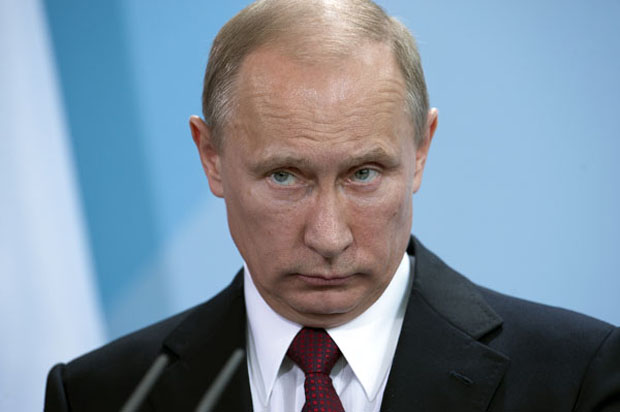
(Image: /Demotix)
Censorship of anti-war sentiment in Russia now uses a mixture of state-sponsored media attacks, arms-length loyalists, crooked think tanks and legal strong-arming – but is it working?
Politonline, a website well-known for its support of Putin, has produced an article with the top twenty most “negative” news sources in Russia. Editors claim to have pioneered a methodology which can gauge “emotional sentiment and tone” in online articles. Politonline don’t elaborate on how the algorithm has been put together, or indeed the source data they used. However some of the keywords used have been published, including the words “annexation” and “support for Crimea.”
Meanwhile, a prominent academic has been publically slammed by a pro-Putin think tank, in a pro-Putin newspaper, after he compared Hitler’s strategy in Anschluss with the annexation of Crimea. Professer Andrei Zubov was also dismissed by his employers – the Moscow Institute for International Relations. The Institute for Democracy and Co-operation, the think tank who critiqued the article, included a list of American academics who had lost their jobs over their political views – although many had been fired for comments which were overtly racist, sexist, or incited hate.
The man who blew the whistle on Putin’s invasion in Crimea, Lev Shlosberg, has also been targeted by his opponents. Some of the masked paratroopers now in Crimea were originally based in his home region : Shlosberg helped alert the media when the invasion began. A legislator and newspaper editor, he has since been accused of being a “fifth columnist” and “traitor.” In an interview on the Russia 1 television channel, Putin’s press secretary Dmitri Peskov adopted a similar strategy when he smeared dissenters as “professional critics” and a “nano-fifth column.”
Alexey Navalny, a lawyer, blogger and pro-reform opposition politician has also faced penalties. A lengthy article he published on his blog regarding Crimea prompted authorities to accuse him of breaking the terms of his house arrest. Authorities then blocked access to the site, and warned citizens that anyone promoting his article online would be subject to unspecified sanctions.
Protesters brave enough to go on the streets are also being met with state-sponsored aggression. Tanya Lokshina, Russia Program Director and Senior Researcher at Human Rights Watch, told Index that “anti-war protesters have been subject to arbitrary detention, harassment, intimidation, and even physical attacks.”
Between February 21st and March 4th, the NGO allege that police detained well over a thousand peaceful protesters in Moscow alone. Courts ordered at least fifteen of them to serve ten days of administrative detention for alleged failure to obey police orders, and fined dozens of others for participating in unauthorized public gatherings. The majority are still awaiting administrative court hearings. Other cities have seen similar policing tactics and unfair judicial process.
“Many wondered what a post-Sochi crackdown might look like,” Hugh Williamson, Europe and Central Asia director at Human Rights Watch told Index. “These detentions, the crackdown under way on the media, and violent attacks against dissenters by unidentified assailants paint a stark picture of what is going on in Russia right now.”
So is all this working? In December, Putin’s popularity was at its lowest since 2000, according to a report on the Reuters website. Polling conducted by the Levada Agency showed that “61 percent of respondents voiced approval for Putin’s performance in November, down from 64 percent in October and the previous low this year of 62 percent, recorded in January.”
It’s also notable that before the Crimea crisis escalated, the Russian people were indifferent to Euromaidan. Another Levada poll showed that 63% of Russians didn’t sympathise with either Yanukovych or the protesters.
However a poll by VTsIOM, conducted in March after troops had moved into Crimea, showed that Putin’s approval ratings had leapt up. VtsIOM is state-run but according to Russian politics analyst Mark Adomanis, “remains one of the most widely respected polling outfits in Russia.”
Crimea has sent Putin’s poll numbers skyrocketing,” says Adomanis, who writes a column for Forbes about Russian politics and economics. “Levada currently has him at a little over 80%, his highest level since 2010.”
“Other agencies have shown a similar rebound in his numbers – pretty much everyone agrees that the poll numbers are the best in a long time.”
Adomanis also commented on the lack of media, political and academic freedom surrounding the Ukraine crisis.
“Even in democratic societies there’s always a concern that polling can be heavily influenced by the nature of media coverage. It’s definitely more of a concern in Russia, given the heavy-handedness with which the authorities manage the press
“You can’t totally separate the biased coverage from popular support, but I don’t think one can fully explain the other.”
So Putin’s strategy in Crimea has played out well politically. It’s hard to know what the polls would have been like had the press been able to fully criticise his actions, or had street protests been allowed to go on unhindered. It’s also likely that the long-term economic impact of the annexation will be great enough to push polls down again in the future. However, the tactics used by the authorities to keep dissent out of the public psyche appear well-rehearsed and difficult to counter. A quick review of any Russia Today bulletin, compared with multiple on the ground sources in Kiev, Crimea and eastern Ukraine, reveal that the Russian public are not getting the full picture about their leaders international transgressions.
This article was published on April 14, 2014 at indexoncensorship.org
7 Mar 2014 | News, Religion and Culture, Ukraine, Young Writers / Artists Programme
As the Euromaidan protests gripped Ukraine, French street-artist Roti travelled to Kiev. He was eager to support protesters who were struggling with a violent police response to their government’s tilt toward Russia.
For months Roti had worked on an idea for a sculpture: A woman emerging out of water. The concept, which was originally meant for Paris, took on new meaning as the demonstrators in Kiev became set on revolution.
Roti cast his idea in marble and the sculpture, New Ukraine, became an allegory for Euromaidan protesters. The woman’s face, toes and hands protruded from the block of stone. As she struggled for freedom, she created ripples in the stone surrounding her – after all, discontent spreads.
On January 7, 2014, the artist illegally installed his work at the center of Kiev’s Independence Square. “It’s a gift. Not to a nation but to its people”, Roti declared. His intentions were clear. The work came as attacks on journalists and protesters became more and more regular. New Ukraine was a symbol of hope and progress at a time when resolve could have easily wavered.
The night of the installation, protesters celebrated by dancing and singing in the street. Confidence seemed momentarily rejuvenated. In the following weeks clashes between police and protesters would claim their first lives.
New Ukraine is not the only street-art to offer support to the Ukrainian people. Graffiti decorates Kiev’s main square – crossed out swastikas and the slogan “BIG BROTHER IS WATCHING YOU” have become common features.
During protest, street-art becomes a barometer of social consciousness. Scrawled words and images on city walls reflect changing attitudes and a disdain for the ruling authority. The stencils of President Yanukovych’s body, punctured with bullet holes, were a more extreme example.
Like the ripples of New Ukraine, street art spread ideas through Kiev and further afield. With Twitter and Reddit offering a more collective version of the news, artists’ efforts escaped the borders of Ukraine and communicated their message to the global community. They achieved impact through imagery and reached a more diverse audience than most newspapers.
It was on Reddit that I discovered a photograph of a police barricade. It had been painted with a cartoon depicting a Ukrainian flag holding hands with a European flag as Russia looks on, scowling. The message was simple but memorable.
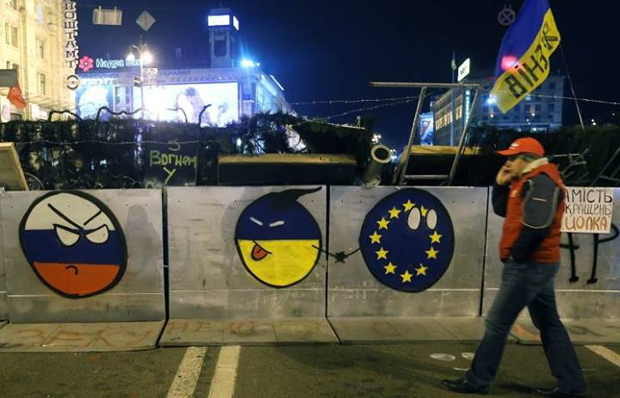
Protest posters also played an important role in boosting morale. Displayed around Kiev during the early days of the crisis, they highlighted the government’s inconsistencies and the power of the Ukrainian people. Of course, the country’s flag’s blue and yellow is the overriding color theme. Pairing graphic design with emotionally engaging political statements – “I am a drop in the ocean” – these works were incredibly empowering.
With a selection of these posters currently on display in Edmonton, Canada, it’s easy to see how imagery has the power to spread a political message. The exhibition features 50 designs which were posted around Ukraine. Each work was designed to encourage their audience to identify emotionally while keeping the message clear.
Artists use symbolism to monumentalise protesters’ efforts. With museums and galleries filled with artist’s renditions of historical events, we are programmed to link iconic moments with art. As creativity littered Kiev’s Independence Square, demonstrators were spurred on – the art around them transformed Euromaidan into a very stirring moment. Demonstrators were reminded: Here is the chance to make history.
Although they have since been annulled, anti-protest laws and restrictions on social media revealed the extent of how close Ukrainians came to losing the right to express themselves.
But on the streets, ideas would have continued to appear on walls and barricades. Street-artists cannot be tracked by algorithms. During times of crisis, they will always be on hand to support the people and spread their message.
This article was published on March 7, 2014 at indexoncensorship.org





